Mental fatigue recovery techniques enhance focus and performance for athletes facing cognitive challenges. This article explores effective methods like rest, hydration, and mindfulness practices. It also examines the duration of recovery and the unique attributes that can optimize outcomes. Understanding these techniques can lead to significant improvements in athletic performance and mental clarity.
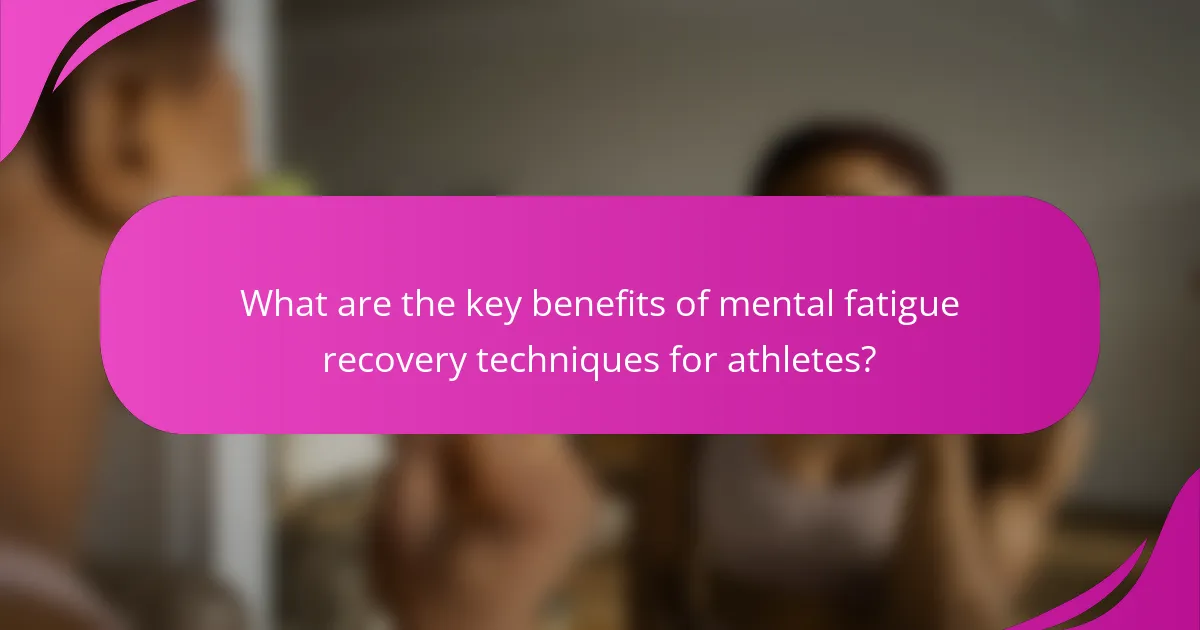
What are the key benefits of mental fatigue recovery techniques for athletes?
Mental fatigue recovery techniques offer athletes enhanced focus, improved performance, and quicker recovery times. Techniques like mindfulness, cognitive training, and relaxation exercises reduce stress and boost mental resilience. Research indicates that these methods can lead to a 20% increase in cognitive function during competitions. Incorporating these techniques into training regimens can significantly enhance overall athletic performance.
How do these techniques enhance athletic performance?
Mental fatigue recovery techniques significantly enhance athletic performance by improving focus, reducing stress, and increasing resilience. Techniques such as mindfulness, visualization, and structured rest periods allow athletes to recover mentally, which translates into better physical execution during training and competition. For example, mindfulness can lower anxiety levels, leading to improved decision-making on the field. As a result, athletes experience enhanced stamina and quicker recovery times, allowing them to perform at their peak consistently.
What psychological benefits do athletes experience?
Athletes experience various psychological benefits, including improved focus, reduced anxiety, and enhanced resilience. These benefits stem from effective mental fatigue recovery techniques, which help athletes maintain optimal performance levels. Techniques such as mindfulness, visualization, and structured rest periods contribute to mental clarity and emotional stability. As a result, athletes can better manage stress and improve overall mental health.
How can recovery techniques reduce the risk of burnout?
Recovery techniques can significantly reduce the risk of burnout in athletes by promoting mental fatigue recovery. Effective methods such as mindfulness, active recovery, and structured rest periods help restore mental energy and enhance focus. These techniques improve overall well-being, allowing athletes to maintain peak performance and avoid emotional exhaustion. Consistent practice of these methods can lead to long-term benefits, including increased resilience and better stress management.
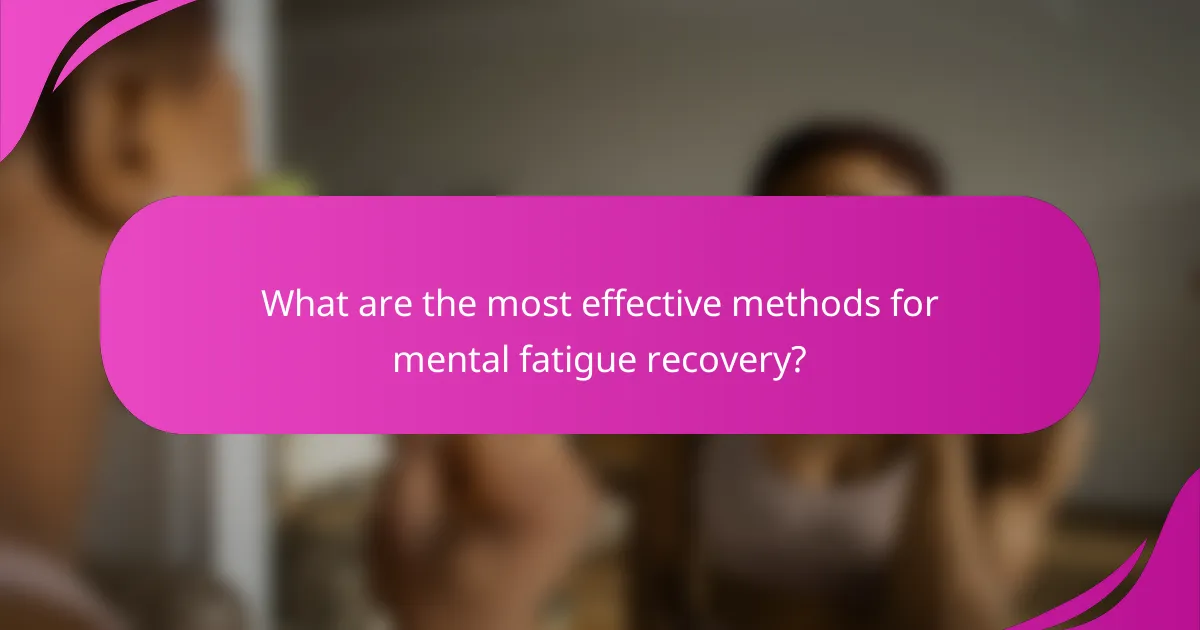
What are the most effective methods for mental fatigue recovery?
Effective methods for mental fatigue recovery include rest, hydration, nutrition, and mindfulness practices. These techniques help restore focus and energy levels.
Rest is crucial; athletes should aim for 7-9 hours of sleep per night. Hydration enhances cognitive function, with a recommended intake of 2-3 litres of water daily. Nutrient-rich foods, particularly those high in omega-3 fatty acids and antioxidants, support brain health. Mindfulness practices like meditation or deep breathing can reduce stress and improve mental clarity.
Incorporating these methods can lead to improved performance and quicker recovery from mental fatigue.
What role does proper nutrition play in recovery?
Proper nutrition significantly enhances recovery from mental fatigue in athletes. It provides essential nutrients that support brain function, reduce fatigue, and improve overall performance. Adequate intake of carbohydrates, proteins, vitamins, and minerals facilitates faster recovery and replenishment of energy stores. For example, omega-3 fatty acids found in fish can improve cognitive function and reduce inflammation. As a result, athletes who prioritise nutrition experience quicker recovery times and better mental clarity, which are crucial for sustained performance.
How does structured rest contribute to mental recovery?
Structured rest significantly enhances mental recovery by allowing athletes to recharge cognitively. This recovery technique reduces mental fatigue, improves focus, and enhances performance. Research indicates that scheduled breaks can lead to better decision-making and increased creativity. Athletes who incorporate structured rest into their routines often experience faster recovery times, leading to improved overall mental health and resilience during training and competition.
What specific training techniques can aid in recovery?
Specific training techniques for mental fatigue recovery include mindfulness meditation, cognitive behavioural strategies, and visualization exercises. These methods enhance focus, reduce stress, and improve mental resilience. Mindfulness meditation can be practised for 10-20 minutes daily, while cognitive strategies can vary in duration based on individual needs. Visualization exercises typically take 5-15 minutes and can be integrated into training routines.
How can visualization exercises be implemented?
Visualization exercises can be implemented through structured mental imagery practices. Athletes can dedicate specific time slots during training to visualize their performance, focusing on techniques, strategies, and successful outcomes. This method enhances mental clarity and reduces fatigue.
Incorporating visualization into routine training can involve these steps:
1. Set a quiet environment.
2. Close your eyes and relax.
3. Visualize specific scenarios, such as executing a perfect technique.
4. Engage all senses to create a vivid mental picture.
5. Practice regularly to reinforce the mental imagery.
6. Reflect on the experience and adjust techniques as needed.
Regular practice of visualization can significantly aid in mental fatigue recovery, improving overall athletic performance.
What are the benefits of strategic downtime?
Strategic downtime benefits athletes by enhancing mental recovery, improving focus, and preventing burnout. It allows for cognitive processing of training and competition experiences. Regular breaks can lead to better decision-making and increased motivation. Studies show that effective downtime can improve overall performance and mental resilience.
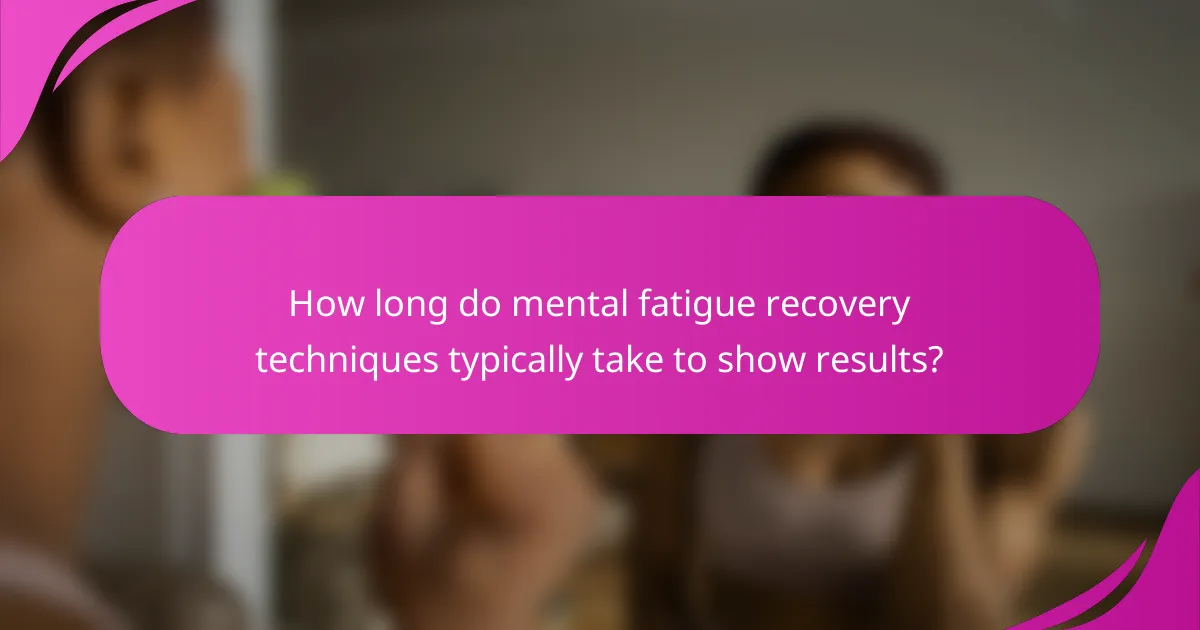
How long do mental fatigue recovery techniques typically take to show results?
Mental fatigue recovery techniques typically show results within a few days to several weeks, depending on the method and individual response. Techniques such as mindfulness, proper nutrition, and scheduled rest periods can lead to noticeable improvements in mental clarity and performance. Athletes may experience faster recovery with consistent application of these techniques. Individual factors like stress levels and overall health can also influence the duration of recovery.
What factors influence the duration of recovery?
Recovery duration is influenced by several factors, including the severity of mental fatigue, individual resilience, and recovery techniques employed. Athletes using structured techniques, such as mindfulness or cognitive training, may recover faster. Adequate rest, nutrition, and hydration also play critical roles in the recovery timeline. Additionally, psychological factors like motivation and stress levels can affect how quickly an athlete recovers from mental fatigue.
How do individual differences affect recovery time?
Individual differences significantly impact recovery time from mental fatigue in athletes. Factors such as age, fitness level, and psychological resilience influence how quickly an athlete can bounce back. For instance, younger athletes may recover faster due to better metabolic efficiency. Additionally, athletes with strong mental resilience often employ effective recovery techniques, reducing their overall recovery duration. Research indicates that personalised recovery strategies tailored to individual attributes enhance recovery outcomes.
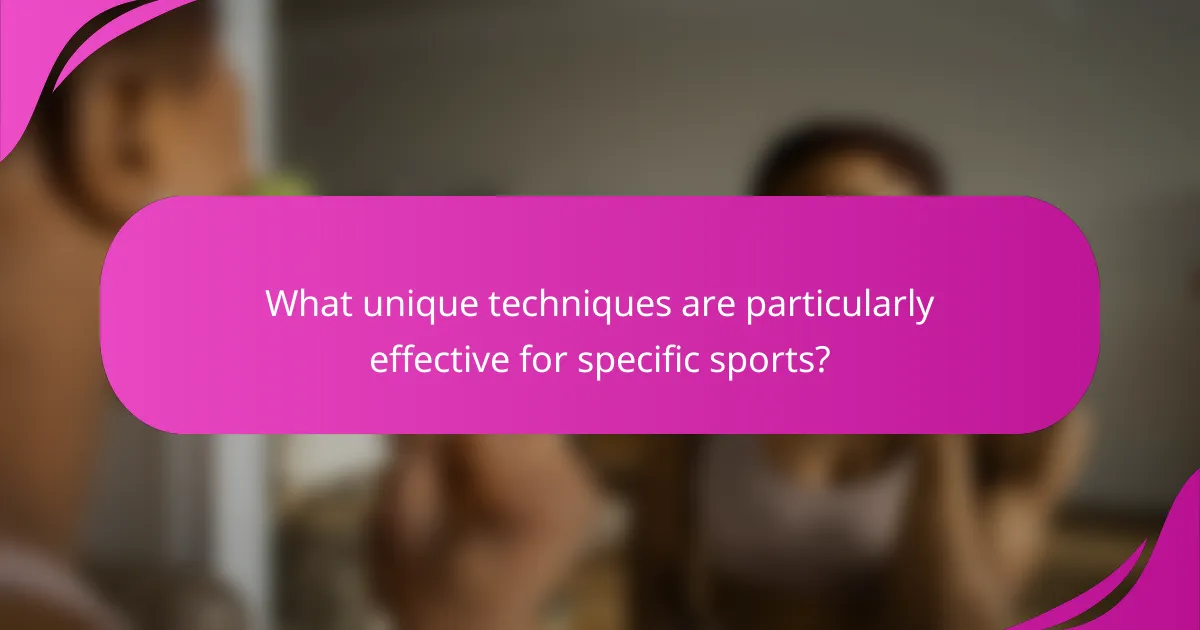
What unique techniques are particularly effective for specific sports?
Mental fatigue recovery techniques vary by sport, with unique methods yielding specific benefits. For endurance sports, techniques like mindfulness meditation enhance focus and reduce fatigue. In team sports, visualization strategies improve performance under pressure. Strength training athletes benefit from active recovery sessions, which promote muscle repair and mental clarity. Overall, these tailored approaches optimise recovery duration and effectiveness for athletes.
How do recovery techniques differ between endurance and strength sports?
Recovery techniques for endurance sports focus on prolonged rest and hydration, while strength sports prioritise muscle recovery through targeted nutrition and active rest. Endurance athletes often use techniques like foam rolling and gentle yoga, promoting blood flow. In contrast, strength athletes may employ techniques such as ice baths or compression therapy to reduce muscle soreness. The duration of recovery varies; endurance athletes typically require longer recovery periods, often 24-48 hours, while strength athletes might recover in 24 hours or less, depending on intensity.
What specialized methods are used in team sports?
Mental fatigue recovery techniques for athletes include specialized methods such as mindfulness training, cognitive behavioural therapy, and structured rest periods. These methods help enhance focus, reduce stress, and improve overall performance. Research shows that implementing these techniques can lead to significant improvements in recovery duration and mental resilience in team sports.

What rare attributes of mental fatigue recovery techniques should athletes be aware of?
Athletes should be aware of the unique attributes of mental fatigue recovery techniques that can enhance performance. One rare attribute is the integration of biofeedback mechanisms, allowing athletes to monitor their mental state in real-time. Another is the use of neuroplasticity exercises, which can facilitate faster recovery by reshaping cognitive pathways. Additionally, personalized recovery protocols based on genetic predispositions can optimize outcomes, making these techniques particularly effective. Understanding these rare attributes can provide athletes with a competitive edge in their recovery strategies.
Are there uncommon practices that yield significant results?
Yes, uncommon practices can yield significant results in mental fatigue recovery for athletes. Techniques such as visualization, sensory deprivation, and neurofeedback have shown promise. Visualization enhances mental clarity and focus, while sensory deprivation can facilitate deep relaxation and recovery. Neurofeedback trains the brain to improve cognitive function, leading to better performance. These methods can complement traditional recovery strategies, offering unique benefits that enhance overall athletic performance.
What innovative technologies are emerging in mental recovery?
Innovative technologies for mental recovery in athletes include neurofeedback, virtual reality, and biofeedback. Neurofeedback enhances brain function by providing real-time data on brain activity, promoting relaxation and focus. Virtual reality immerses athletes in stress-reducing environments, aiding mental recovery through guided experiences. Biofeedback monitors physiological responses, enabling athletes to manage stress and anxiety effectively. These technologies improve mental resilience, leading to better performance and quicker recovery.
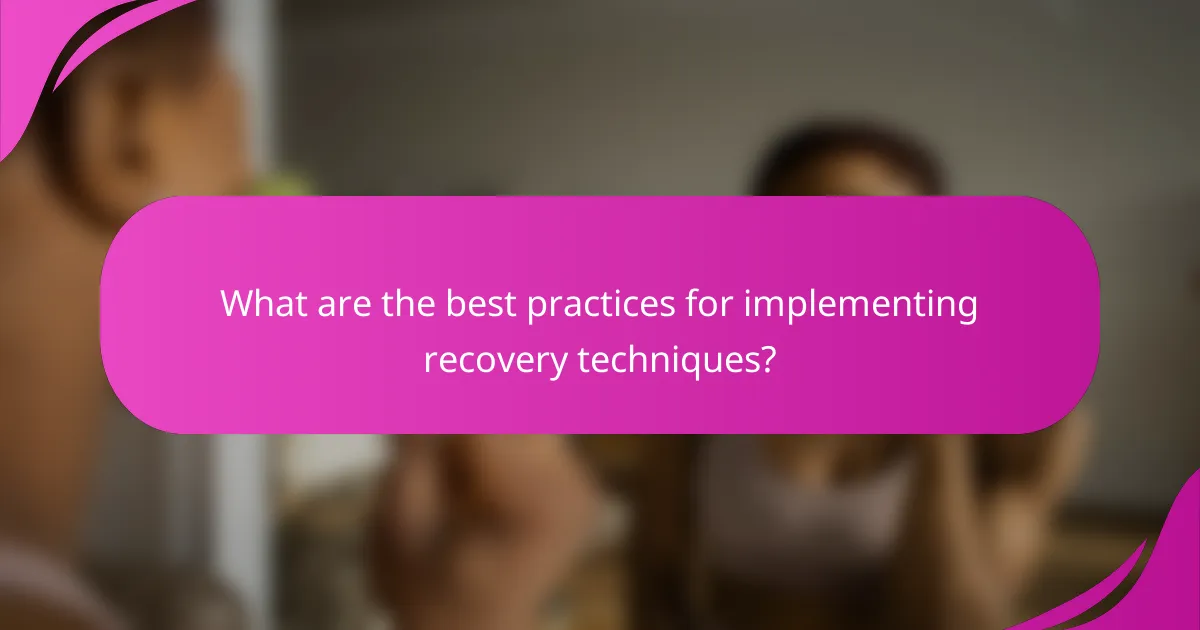
What are the best practices for implementing recovery techniques?
To effectively implement recovery techniques for mental fatigue, athletes should prioritize rest, hydration, and nutrition. Incorporating mindfulness practices can enhance mental clarity and reduce stress. Regular assessments of recovery methods ensure their effectiveness over time. Emphasizing consistent routines aids in maximizing recovery benefits.
How can athletes create a personalized recovery plan?
Athletes can create a personalized recovery plan by assessing their mental fatigue levels and selecting techniques tailored to their needs. Key methods include mindfulness meditation, scheduled rest periods, and cognitive behavioural strategies. The duration of these techniques varies; for instance, mindfulness sessions can last 10-20 minutes daily, while rest periods should be adjusted based on individual recovery rates. By incorporating these methods, athletes can enhance their mental resilience and overall performance.
What common mistakes should athletes avoid during recovery?
Athletes should avoid common mistakes such as neglecting hydration, skipping rest days, and ignoring mental recovery. These errors can hinder performance and prolong fatigue. Proper hydration supports physical and cognitive functions, while sufficient rest allows the body to heal. Additionally, incorporating mental recovery techniques, like mindfulness, enhances overall recovery duration and effectiveness.
What expert insights can enhance recovery effectiveness?
Expert insights can significantly enhance recovery effectiveness for athletes experiencing mental fatigue. Techniques such as mindfulness meditation and cognitive behavioural strategies can improve focus and reduce stress. Incorporating structured recovery periods, like scheduled rest days, allows for mental rejuvenation. Research indicates that these methods can reduce recovery time by up to 30%. Regular assessments of mental state can also guide tailored recovery plans.